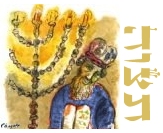|
This week's Torah (Tetzaveh) begins with instructions for kindling the holy lampstand: "command the people of Israel to bring to you pure beaten olive oil for illumination (לַמָּאוֹר) to offer up (olah) a continual lamp (נֵר תָּמִיד)." Note that the word translated "lampstand" is menorah (מְנוֹרָה), from the word for lamp, ner (נֵר). What's interesting about this verse is that the commandment to "offer up a continual lamp" occurs before the Tabernacle - and the menorah - was even made. God's Light must shine first -- even before we can direct our worship to Him.... The Light of His Presence precedes even the "tent of meeting" itself.
 |
There is a Purim connection here. Perhaps you are familiar with the "Urim and Thummim," the "lights and perfections" that the High Priest sometimes used to discern messages from the LORD? Some scholars believe these were like lots (purim) that were used to get "yes/no" responses from the LORD (e.g., 1 Sam. 14:41, 28:6, Ezr. 2:63; Neh. 7:65). When Haman the Agagite kept "rolling the dice" until he found the "propitious" time to seek the destruction of the Jews (Esther 3:7), God was indeed watching. After Haman "divined" the twelfth month (Adar), he appealed to the King to put his hateful plan into action... He slandered the Jews and sought to incite the King's anger against them as traitors who pledged allegiance to a different King... All this was foreseen by the LORD and under His sovereign control. Little did Haman know that the dice he cast was for the appointed day of his own death... And so it goes for all those who "cast the lot" without understanding the overarching sovereignty of God...
On the Shabbat before Purim we are commanded to remember (zachor) Amalek: לא תִּשְׁכָּח / lo tiskach: "Do not forget!" (Deut. 25:19). Since Haman (and other enemies of God) are regarded as Amalekites, we remember that we are in a spiritual war, and the stakes are the highest known by mortal man. On Purim itself we recite the blessing She'asah nissim - "who has wrought miracles for our forefathers, in those days at this season" (just as we do at Chanukah). God is Light, but those who hate others live in darkness -- a deadly kind of darkness. Purim celebrates the deliverance of the LORD for His people and those who trust in Him are surrounded by His Light.
Just before Purim it is considered a mitzvah (or blessing) to send gifts of food to friends (called mishloach manot) and to give tzedekah (charity) to the poor (called matanot la'evyonim). These customs come from the story of Esther itself (Esther 9:22). Sharing with others is a means of spreading the Light of God in this dark and perverse world (1 John 3:17). We then can enjoy our seudah (festive meal) with greater joy.
These are perilous times, chaverim. The battle we face is with fear: fear of man, fear of this world, fear of disaster, etc. The story of Purim reassures us that "all things work together for good to those who love God" (Rom. 8:28). May "God grant us the serenity to accept the things we cannot change; the courage to change the things we can; and the wisdom to know the difference."
Lord God of Israel, we are looking to you at this hour... Help us to remember the truth that You are in complete control of this world and the "outcome of the dice..." It is difficult to find peace in the midst of this world and its storms, but we are looking to You for help.... We are living in the End of Days: the world is reeling in fear and dread, and yet we are called to shine the light of your love and presence at all times. Please help us to walk in the strength and assurance of Your holy Light -- the Light that suffuses all things. Let the Light of Your countenance shine upon us; pour out your shalom upon us. Help us trust that You will work all things together for good, for the sake of the glory of Your Precious Name. We love you and thank you, LORD - help us to walk in your love. B'shem Yeshua Adoneinu - Amen.
<< Return
|




